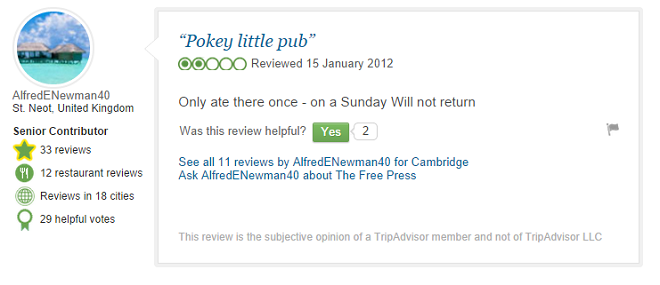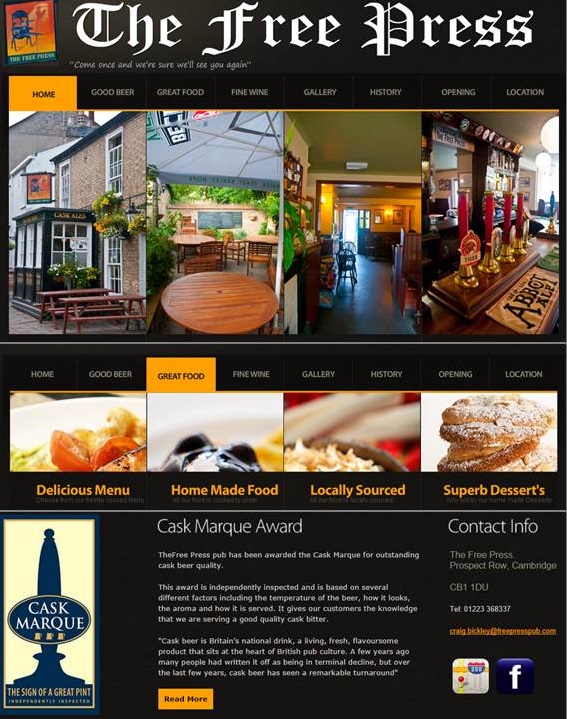

Mathieu Gastal est Directeur associé de l’agence de communication digitale Adveris située à Paris (20 collaborateurs).
You may well have noticed the extent to which certain reviews posted on online restaurant guides like Tripadvisor, Yelp or Squaremeal are scathing and uncalled-for. However, it is quite possible to effectively control these reviews. In fact, monitoring customers’ opinions can prove to be a highly useful source of data.
In recent years, an underlying trend has brought about a significant change in consumer habits.
With the arrival of the web community, sometimes referred to as “Web 2.0”, Internet users themselves are increasingly called on to contribute to the information shared.
A recent poll stated that 57% of consumers regularly consult the opinions of other Internet users before proceeding with a purchase (CREDOC survey). Whether buying a digital camera, booking a hotel or… a table in a restaurant, the opinions of other customers and consumers now have an unavoidable and growing impact.
Reviews (often negative) to be taken with a pinch of salt
The first thing to bear in mind with online reviews and opinions is their biased view. This essentially ties in with human nature:  people often express an opinion when they are dissatisfied (and which thus amounts to a complaint), and very seldom when they are happy. And so, while we may well not think twice about complaining to a hotel’s management following an unpleasant stay, it is highly unlikely that we will congratulate them for a pleasant stay, or simply one in line with what we expected.
people often express an opinion when they are dissatisfied (and which thus amounts to a complaint), and very seldom when they are happy. And so, while we may well not think twice about complaining to a hotel’s management following an unpleasant stay, it is highly unlikely that we will congratulate them for a pleasant stay, or simply one in line with what we expected.
In fact, negative reviews are occasionally left by envious colleagues/competitors (fortunately, this is fairly infrequent). You will also no doubt have noticed how utterly ridiculous certain reviews can be. Indeed, there will always be a handful of extremist and cowardly individuals who leave scathing – and often unjustified – opinions merely to amuse others or to draw attention to themselves. Here is an interesting exemple of how to respond to this type of reviews.
This Restaurant (somewhere) used a very creative, funny and catchy way to respond to a bad review that was posted on Yelp. Not only the restaurant’s owner showed that such reviews did not take away his sense of humour, but it also enabled him to get some free publicity as this picture went viral!

Solutions set up by the sites themselves
The solution set up by French online restaurant guide LaFourchette is particularly commendable: on the very same evening that customers book a table online, they receive a message on their smartphone prompting them to post a review.
As a result, reviews are no longer confined to those who claim to be dissatisfied; anyone willing to spend 10 minutes of their time to state their opinion can do so. To guard against uncalled-for reviews, dependable restaurant guides have adopted a policy for moderating reviews that fail to comply with their ethical code (offensive, unconstructive opinions, etc.). These sites also monitor the IP addresses of the reviews posted (this is the case with Tripadvisor for example).
This means that they can identify reviews posted from the same computer and, if appropriate, decide not to publish them.
Some reviews may otherwise escape their attention, however, they can contact the person responsible for any that are particularly unwarranted.
Reacting to a negative review
In reality, a restaurant manager will (almost) never bring proceedings for slander against an Internet user. With that possibility ruled out, you must be realistic: the first thing to do is to assert your right of reply. The law requires the site’s publisher to publish your reply within 72 hours. You should find the publisher’s contact details in the legal notices at the bottom of the site (this is compulsory by law). You must then send a send a letter with acknowledgement of receipt. Another solution is to ask your regular patrons to support you by posting their appreciations of your establishment. They will be your best advocates, and will in all likelihood be flattered by your request.
Prevention versus repression
Rather than responding to negative reviews, your strategy should be to deploy the means to avoid them in the first place. Put yourself in the shoes of the Internet user who is looking for information on your establishment. Users who do not find a website with the information they are looking for will inevitably turn to whatever information is available, usually reviews left on various online guides, such as Squaremeal, for example. Since, as we mentioned above, reviews tend to be negatively biased, not having your own website in this day and age is effectively asking for trouble…
By controlling your own website, you can orient the message you wish to deliver by highlighting your establishment’s positive aspects and specificities, as well as providing basic (and essential) information such as the address, access map, business hours, prices, and so on.
On the example below, we can see just how important it is for a restaurant to have its own website, otherwise, any Internet user looking for a great place at which to eat out in Cambridge could easily be put off by such a review.

A bad (and poorly justified) review for The Free Press pub and restaurant in Cambridge, UK, found on Tripadvisor.
In fact, the restaurant’s own website is reassuring in many aspects as it shows:
- that it has been awarded the Cask Masque for outstanding car beer quality,
- that the restaurant’s food promise is “home-made” and “locally-sourced”,
- that the outside and inside environment is lovely and nicely maintened, offering a warm and typical pub atmosphere…

You could also consider replying to a bad review through a video posted on your own website and shared on social media like YouTube or Facebook, jus like Domino’s did to apologize to one specific customer about messing her order up, as you can see in the video below.
Using reviews as a management tool…
So far, we have seen how best to avoid the drawbacks inherent to negative reviews concerning an establishment. Here we will focus our attention on how to put reviews to good use. At a time when cameras are increasingly used in certain establishments, in particular to ensure that everything runs smoothly if and when the manager is away, a highly effective way of achieving the same result is to carefully monitor reviews posted by Internet users. If a number of comments reflect on the same issues, they will necessarily infer a reaction on behalf of the restaurant’s management. Here is an example of how a restaurant reacted to a bad review posted by a Yelper user.
The Supper Truck prepared its reply through a customised vodeo clip showing the Sage and Jared’s Happy Gland Band interprating a “sorry” song. The video was viewed more than 11,000 times on YouTube, giving The Supper Truck a great publicity, word of mouth and a fund of good will.

It is good practice to regularly monitor reviews and opinions on your restaurant posted by Internet users.
Our recommendation is to monitor reviews and opinions posted in the leading online restaurant guides in which your establishment is listed once a week, for example.
Today, online reviews carry considerable weight and certainly require your attention. Although they are often perceived as threats, rather than merely putting up with them, they should be optimally monitored, controlled, oriented and exploited. It is good practice to have someone from your establishment monitor them at least once a month. Whether you are a restaurant owner, director or manager, our advice is to consider this issue internally to find out who can best take up this new role within your establishment.





Comments